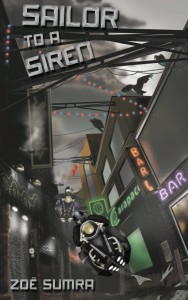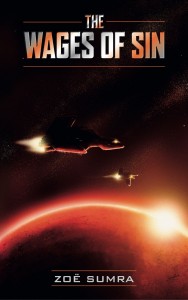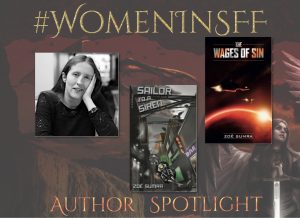Women in SFF Author Spotlight – Zoë Sumra (SAILOR TO A SIREN)
Zoë was born in London, but spent her later childhood living in Lancashire, where she started writing novels at the age of twelve. After completing the obligatory epic fantasy trilogy in her teens, she spent four years at the University of St Andrews, where she learnt to fence both foil and sabre and cemented her passion for space opera. She worked for many years as a print controller in academic publishing and advertising, and now lives in London with her husband, their daughters and a collection of swords. Her novels Sailor to a Siren and The Wages of Sin were published by Elsewhen Press in 2015 and 2017 respectively.
Welcome to the Hive, Zoë. Let’s start small: tell us about a great book you’ve read recently!
I just read Of Dragons, Feasts and Murders by Aliette de Bodard, a novella set in her Dominion of the Fallen series (The House of Shattered Wings and its sequels). A dragon prince goes home to the imperial court for Lunar New Year, taking his fallen-angel husband with him. They find a dead body almost immediately. A highly enjoyable balance between diplomacy and investigation follows.
Okay, time to escalate things: reality warps and you suddenly find yourself leading a D&D-style party through a monster-infested dungeon. What character class are you, and what’s your weapon of choice?
I’m a wizard! Probably (shush) a necromancer. Keep that to yourself! I’m rather fond of the Evocation spell school too. My fallback for when I run out of fireballs or skeletons to summon is a rapier – it’s the closest weapon I’m likely to find to a fencing sabre.
 When you’re not trawling through dungeons raising the dead, how do you like to work? (In silence, with music, or serenaded by the damned souls of a thousand dead shrimps? Do you prefer to type or to hand-write? Are you an architect or a gardener? A plotter or a pantser? D’you write in your underwear, or in a deep-sea diver’s suit?)
When you’re not trawling through dungeons raising the dead, how do you like to work? (In silence, with music, or serenaded by the damned souls of a thousand dead shrimps? Do you prefer to type or to hand-write? Are you an architect or a gardener? A plotter or a pantser? D’you write in your underwear, or in a deep-sea diver’s suit?)
Tell us a little bit about your writing method!
I handwrite all of my first drafts – ideally in bed wearing comfortable clothing, but I can and do write all over the place: on trains, on the beach, in an office at lunch hour, between rounds at fencing tournaments, and in the park watching small children scale climbing frames. In general I work best from brief frameworks rather than beat-by-beat outlines, giving the characters and me plenty of room for improvisation: the characters have to go from A to B to C, but in the interim they can divert via D, Q, X or the square root of pi, as long as they get there in the end.
I’m used to writing with background noise (living near a busy road, plus having two toddlers), so usually put on music or sports commentaries while writing to provide a more predictable sound backdrop. Readers can sometimes spot which commentary I was listening to at the time I first introduced a walk-on character, as my single-scene walk-ons often get named after sportspeople or stadia. This is almost always accidental – I need a name, and my subconscious suggests one that I just heard – but there was that incident with Australian cricketer Mitchell Johnson…
I’ve recently started a second draft, requiring me to be at my computer, so I’ve started getting up early so that I can type from 5.30am to 6.30am without interruption. Unfortunately writing stimulates me too much for me to write just before bed.
What (or who) are your most significant female fantasy influences? Are there any creators whom you dream of working with someday?
I write what I write because of Anne McCaffrey. As I grew up reading her work, which blended science fiction and fantasy without genre division, it felt natural to me to fuse genres similarly when I started to write. My books are shelved as space opera, but they are very much the science fantasy end of that spectrum, as opposed to the mil-SF end.
I would love to write gangland or heist fiction with Fonda Lee, in any given fictional universe or a totally new one. I adore her Green Bone Saga books – their vibe of The Godfather plus wuxia plus mineral-based magic is absolutely up my alley.
What was the last thing you watched on TV and why did you choose to watch it? Alternatively, what games have you enjoyed recently?
I’m still playing Skyrim and loving it, recently dipped a toe into Assassin’s Creed: Odyssey, and vicariously enjoy watching other people play Red Dead Redemption 2 and Horizon: Zero Dawn. In all four cases, I love their balance of exploration gameplay and action.
The world shifts, and you find yourself with an extra day on your hands during which you’re not allowed to write. How do you choose to spend the day?
Panicking! I write best when I write daily, and being banned from writing on this valuable extra day would seem like a cruel trick. I would probably take my two under-fives to the park or for a long ride on the top deck of a bus, and would catch up on my TBR pile in spare moments.
 Can you tell us a little something about your current work(s) in progress?
Can you tell us a little something about your current work(s) in progress?
I’m midway through the second draft of an epic space opera novel, Rough Diamond, set in the same world as my published novels but over a decade later. It’s a superhero origin story with spaceships, magic, arguments, colonialism’s after-effects and family obligation. I’m also working on a sci-fi Robin Hood-esque short story, and am prodding at a near-future sci-fi novel outline (on average I come up with an idea at least a year before starting to write it, so that one will take some time to turn into a manuscript).
What’s the most (and/or least) helpful piece of writing advice you’ve ever received?
All authors who are not full-time writers have to perform a balancing act between our writing work and obligations we have with education, paid work and caring duties. The best writing advice I’ve ever received is to be realistic about one’s capabilities versus one’s inescapable obligations, and go easy on oneself. Writers tend to be perfectionists – which is not a bad thing: it helps us with accuracy across multiple manuscripts over multiple years – but one mustn’t allow perfectionism to lead to beating oneself up over a clash of responsibilities.
Every writer encounters stumbling blocks, be it a difficult chapter, challenging subject matter or just starting a new project. How do you motivate yourself on days when you don’t want to write?
I remind myself that I’m a momentum writer. One missed day, for me, can mean a missed week or month. Many writers are not like this and can take a day off here and there just fine, as a break or due to commitments. I really work best if I keep going, even if only a page, or just a paragraph. One paragraph per day eventually adds up to a book.
If you could visit any country at any point in history, where/when would you go, and why?
I would go to Sri Lanka in the fifth century CE so that I could see Sigiriya when the palace and city were intact, particularly to check out the gardens and frescoes. It’s an impressive sight now, even ruined, and would have been one of the world’s true wonders at the time.
Who are your favourite female characters in literature or pop culture? And do you have a favourite type of female character you enjoy writing?
The life of Julie d’Aubigny is a novelist’s dream. She was a French noblewoman in the late seventeenth century who was both a skilled singer and an expert fencer, and who had very little regard for societal expectation: she once took holy orders specifically so that she could get into a convent and rescue her girlfriend (who had been sent there by her family as punishment for lesbianism), once seduced a man whom she had beaten in a duel the day before, and in 1695 was expelled from Paris for fighting duels – she was challenged to the duels in question after kissing a noblewoman at a party. One of my imminent projects, outlined but not started, is an Enlightenment-setting fantasy novel, in which a leading character is based on Julie.
This sounds amazing Zoë!
My favourite female characters to write know what they want and are prepared to shoot for the moon to get it. Some are realistic about the obstacles in their way and work round them, or search for their weak points: others are more prone to act as if the obstacles don’t exist.
Tell us about a book that’s excellent, but underappreciated or obscure.
I’d like to nominate Juliet McKenna’s two most recent books, The Green Man’s Heir and The Green Man’s Foe. They are contemporary fantasy – definitely not urban fantasy as they are set in the English countryside. The main character is the son of a dryad and a human, trying to navigate both the modern world of jobs, relationships and police investigations and the hidden world of creatures from folklore that most people can’t see, which becomes very awkward when the two worlds collide.
Finally, would you be so kind as to dazzle us with an elevator pitch? Why should readers check out your work?
If you liked Peter McLean’s fantasy Kray brothers in Priest of Bones, you should love my science-fantasy Kray brothers in Sailor to a Siren and The Wages of Sin. In Sailor to a Siren, the heist goes right but the Cardwain brothers cannot trust anyone with the proceeds: in The Wages of Sin, a dead body leads Connor Cardwain to an interstellar mystery that he is running out of time to solve. The latter book features three women in their forties, which shouldn’t feel as unusual as it does.
That’s brilliant! Thank you so much for joining us today, Zoë!

